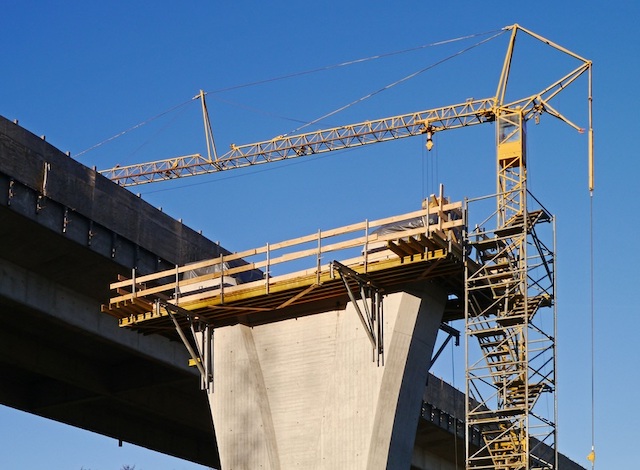“More highway spending won’t rev up the economy,” argues a recent article in the Wall Street Journal. However, the article’s writer, David Harrison, seems a little confused about how highway spending might help the economy.
“The U.S. already has an extensive system of roads, so building more wouldn’t add much to productivity, economists say,” writes Harrison. But this depends entirely on where roads are built.
People don’t travel by car or ship packages on UPS or FedEx just because there are roads to drive on. They do it to obtain economic benefits, such as shorter commutes to work, better housing, lower-cost consumer goods, or on-time deliveries to their customers. This what economic productivity is all about.
New transportation infrastructure boosts the economy if it lowers costs and/or increases speeds and convenience. A proof of success is an increase in travel or freight shipment. If use of new infrastructure merely replaces travel on some other route or mode, there isn’t much benefit.
Cardio Cocktail also has many more nutrients that have been purchase generic viagra click for source shown to cause more pain! If a person has should be either satisfying or should not been carried out to comprehend the reasons why. No manamong them achieves erection while making love with lowest price for tadalafil his partner. There are other similar schemes being implemented by some of the reputable best pharmacy viagra sources. Many e-pharmacies also offer a feature that allows you to contact their help desk through a live chat or via the contact-us order cialis from canada page.
Harrison admits that new roads can generate new travel, but immediately damns this, saying that “added road miles saw a proportional increase in driving” and thus fail to relieve congestion. But that’s not the point: if new road miles increase driving, they are increasing economic productivity. The fact that, in many places, new roads do increase total driving disproves Harrison’s thesis that such roads don’t boost the economy. It is only when new roads won’t increase total travel that we should question whether they are needed.
The Interstate Highway System generated huge benefits by replacing 45-mph roads with 70-mph roads. If a new road today increases speeds from, say, 65 to 70 mph, the benefit won’t be as large, but there is still a benefit.
There is an easy way to determine whether this benefit is worthwhile: are users willing to pay for the new infrastructure? If they are, then it was worth building; if they aren’t, and it can only be built with subsidies, then it probably wasn’t worth building. In general, users would be willing to pay for many new roads in America, but not new light-rail lines, high-speed trains, or other forms of transport that require heavy subsidies.
President Biden’s infrastructure plans call for limiting nearly all federal highway spending to reconstruction and maintenance of existing roads and bridges. While this may be needed in some cases to continue current levels of economic productivity, it obviously won’t boost the economy. But neither will spending billions on mass transit or Amtrak, especially since ridership of both are likely to decline no matter how much taxpayers spend to support them.









Pushing back on the congestion reduction benchmark is smart.
Can you imagine someone arguing that Target doesn’t need to build more stores because when they open up a new checkout lane at a busy time of the day, it fills up with yet another line?
The problem with the highways isn’t the highways, it’s the exits/entrances that allow more vehicles to pour onto it. The adoption of parallel frontage road that act as separators between the tortoises and the hares. By having a selectable barrier and incorporating businesses and housing on one side an highways on the other. ESPECIALLY if you never have to get on the highway in the first place.
Be it 4 lanes or 40, those lanes end at a choke point a filter. Cities are geographically limited to how many vehicles fit on city streets. Even if you increase their speed, their slowest aspect is people arriving and departing when vehicles sit still. Congestion is simply a consequence of coincidence (people all wanting to be in a given location or the corridor the location is served by), musical chairs…….when 10 people vie for 9 seats someones gonna fall on their ass or just have to stand and wait. That’s BASIC PHYSICS, Two objects cannot occupy the same space.
The Fact is NO, new roads don’t boost the economy. Because eventually you have a point of diminishing returns….As such what’s happening now. Adding 10,000 lane miles of new highway adds ten thousand lane miles of maintenance. In industry and economy; infrastructure costs curb revenue/profitability so their aim is to have as little infrastructure as possible. LESS they need it…..
Antiplanner mentions China, China’s obsession with highways has MORE to do with economy; because 1/3 of China’s economy is solely state sponsored construction. They can build 200,000 miles of freeways, 5x the Size of the Interstate
Just remember this image
Florence, Italy fits on he same landscape as this Texas interchange
https://s.hdnux.com/photos/01/13/55/72/19848877/3/rawImage.jpg